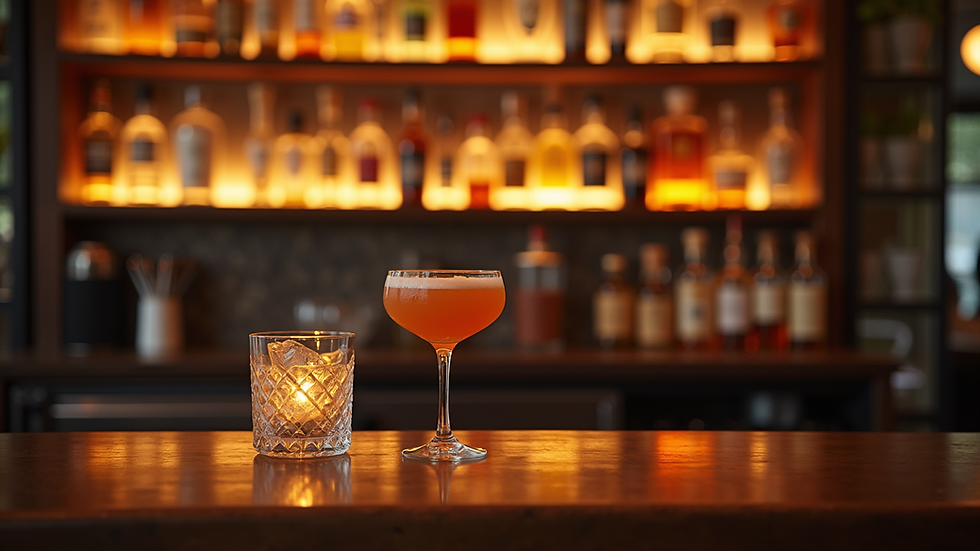Understanding Alcohol Consumption and Its Effects
- Nikola Tikov

- Oct 26
- 3 min read
Updated: 3 days ago
Alcohol impacts the central nervous system, causing various physical and psychological changes. In small amounts, it can lead to relaxation and even happiness. But with increased intake, guests might experience impaired judgment, poor coordination, and emotional instability.
As blood alcohol concentration (BAC) rises, symptoms range from light intoxication to severe impairment. For example, a BAC of 0.08% (the legal limit for driving in many U.S. states) can cause significant disruption in motor skills and cognitive functions. Knowing these stages can help hosts identify when a guest has had too much.
The Science Behind Alcohol Consumption
Understanding how alcohol affects the body is essential for any host. When consumed, alcohol is absorbed into the bloodstream, influencing brain function and behavior. This process can lead to various reactions, both positive and negative.
At lower levels, alcohol may enhance social interactions. However, as consumption increases, the risk of negative outcomes rises. This knowledge empowers hosts to create a safer environment for their guests.
Common Abnormal Reactions
Physical Symptoms
Guests who drink excessively can show several physical signs. Common symptoms include slurred speech, difficulty walking, and red or flushed skin. In more serious situations, nausea, vomiting, or even unconsciousness can occur.
Example: A study found that approximately 2,200 people die each year from alcohol poisoning, illustrating the severity of excessive drinking. Being able to spot these symptoms early is crucial to prevent dangerous outcomes.
Emotional and Behavioral Changes
Alcohol can change how people feel and act. Some guests may become overly emotional, agitated, or excessively friendly, potentially leading to awkward conflicts. In social scenarios where emotions run high, such changes can escalate quickly.
Statistic: Research shows that around 40% of violent crimes involve alcohol. Being mindful of these emotional shifts is essential for hosts to keep the environment safe.
Social Dynamics
When alcohol consumption is high, social dynamics can morph. Guests may engage in risky behaviors, such as making inappropriate jokes or attempting to leave alone while impaired.
This creates dilemmas for hosts. They must ensure guests have fun while also upholding safety measures, which can be a balancing act.
Strategies for Managing Overconsumption
Setting Clear Boundaries
Before the event, establish clear drinking boundaries. Consider limiting how many drinks are served and providing a variety of non-alcoholic choices. Encourage guests to pace themselves, promoting an atmosphere of responsible consumption.
Example: If you provide snacks and water alongside drinks, guests may be less inclined to drink excessively. Setting these guidelines fosters a more pleasant and controlled environment.
Monitoring Guests
During the event, watch your guests' drinking closely. Check in with those who seem to be drinking heavily and offer support if needed.
Recommendation: Have a designated area where guests can rest or cool down if they start feeling unwell. This proactive approach can help prevent situations from escalating.
Providing Support
If a guest does overconsume alcohol, offer assistance. This can mean providing plenty of water, snacks, or even a quieter space for them to recover. In certain cases, calling a taxi or rideshare service ensures they get home safely.
Being ready to lend a hand can greatly enhance a guest's experience and safeguard their well-being.

The Role of Education
Educating guests on responsible drinking is an effective way to prevent excessive alcohol consumption. Informing individuals about alcohol's effects promotes responsible choices. This might include casual talks about limits or offering pamphlets that contain helpful information on drinking responsibly.
Statistic: A study indicated that events focused on moderation saw a 25% reduction in excessive drinking among participants, highlighting the importance of education.
Creating a Safe Environment
Encouraging Open Conversations
Encouraging open conversations about alcohol can help foster a culture of responsibility. Guests should feel comfortable discussing their limits and seeking help if needed. This openness can create a supportive atmosphere where everyone looks out for one another.
Utilizing Technology
In today's digital age, technology can be a great ally. Consider using apps that help track alcohol consumption or remind guests to drink water. These tools can provide gentle nudges toward responsible drinking without being intrusive.
Setting a Positive Example
As a host, your behavior sets the tone for the event. By drinking responsibly and demonstrating moderation, you encourage guests to follow suit. This creates a ripple effect, promoting a culture of safety and enjoyment.
Final Thoughts
Recognizing abnormal reactions due to excessive alcohol consumption is key to fostering a safe and enjoyable environment. By being aware of the signs of heavy drinking, taking proactive steps to manage consumption, and offering support when needed, hosts can enhance everyone's experience.
Building a culture of responsible drinking not only supports individual guests but also improves the overall atmosphere at social events. Prioritizing safety ensures that gatherings are memorable and enjoyable for all.
By implementing these strategies, you can create an environment where everyone feels comfortable and safe. Remember, the goal is to enjoy the moment while ensuring that everyone leaves with positive memories.



Comments